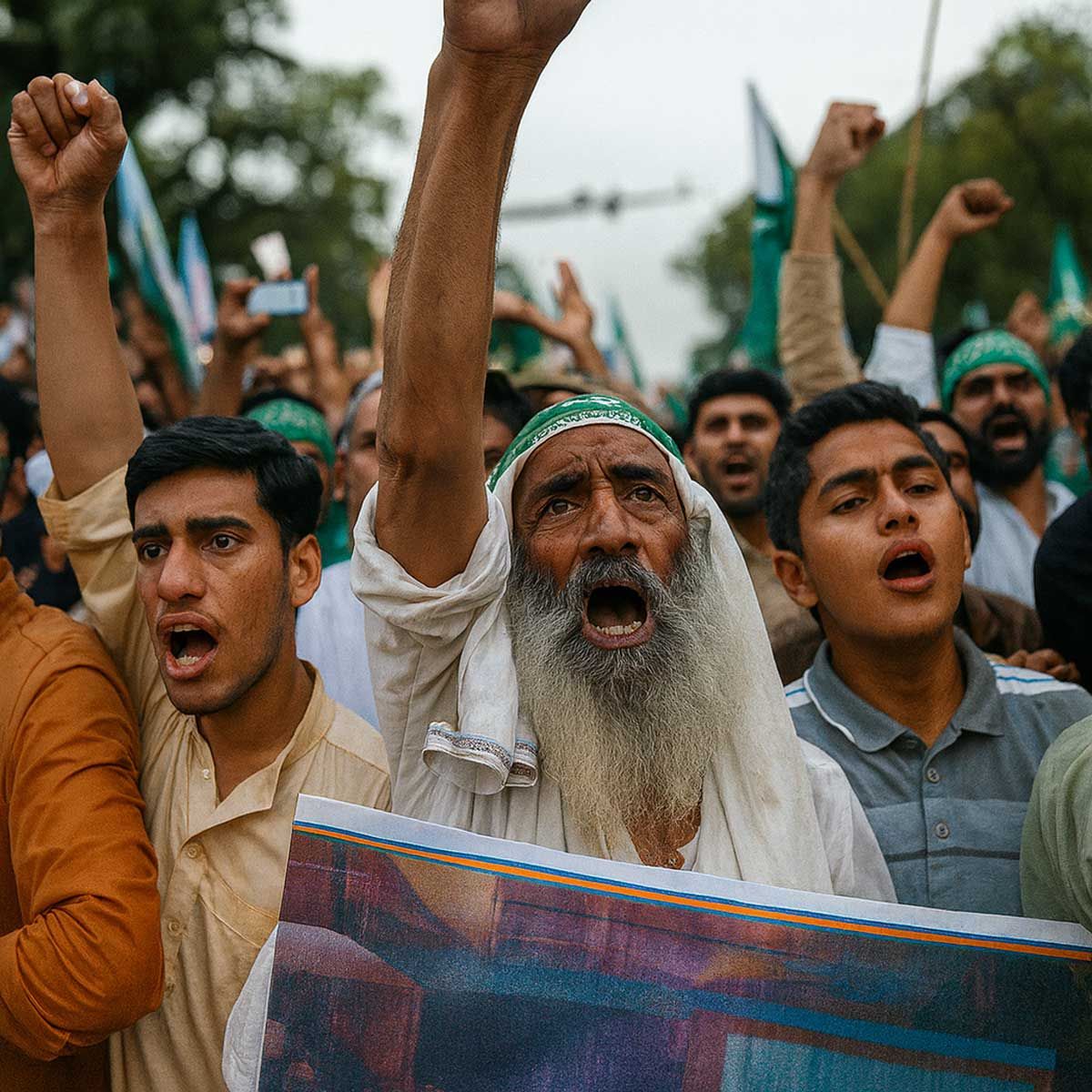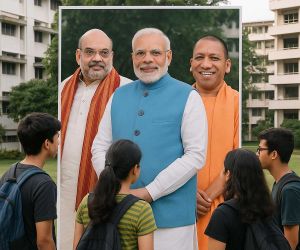MORE COVERAGE
Twitter Coverage
Satyaagrah
Written on
Satyaagrah
Written on
Satyaagrah
Written on
Satyaagrah
Written on
Satyaagrah
Written on
JOIN SATYAAGRAH SOCIAL MEDIA
A wave of revolution grips Pakistan-occupied Kashmir as Awami Action Committee leads mass strikes in Muzaffarabad and Kotli, with thousands demanding Azadi and justice from Pakistan

On Monday, September 29, Pakistan-occupied Kashmir (PoK) ground to a halt. The Awami Action Committee (AAC) launched a region-wide “shutter-down and wheel-jam” strike, calling on people to shut shops, stop transport, and stay off the roads. The AAC made clear: this was not a protest against one institution, but a revolt against decades of political and economic abandonment by Islamabad.
|
In Muzaffarabad, Shaukat Nawaz Mir, a senior AAC leader, addressed reporters firmly:
“Our campaign is not against any institution but for the fundamental rights denied to our people for over 70 years. Enough is enough. Either deliver on rights or face the wrath of the people.”
Mir did not mince words — he said the strike was a direct response to government corruption, resource exploitation, and rising poverty. He said the elite have been misusing public wealth, funneling it into bribery and political patronage, while the people suffer.
Across PoK, shops remained shuttered, public transport stopped, and daily life nearly collapsed. Lawyers and civil society joined in support, adding legitimacy to the protests. Meanwhile, PoK diaspora communities in the United States, the United Kingdom, and across Europe organized solidarity rallies, putting pressure on international media and governments to notice.
News reports suggest that in Muzaffarabad, at least two people have died and 22 were injured as protesters clashed with security forces. Some local sources say armed groups backed by the Pakistani state, including the Muslim Conference, opened fire on demonstrators. The heavy toll underscores how dangerously the government is treating ordinary citizens.
|
Why the people are protesting
At the heart of this movement lies the 38-point charter of demands put forward by the AAC. These demands reflect years of pent-up anger and a desire for justice. Among the key demands:
The abolition of the twelve Assembly seats reserved for Kashmiri refugees settled in Pakistan. Protesters say these seats are a tool for Islamabad to impose political control over PoK, undermining genuine local representation.
A total overhaul of hydropower contracts and revenue-sharing. PoK is rich in water and valley resources, but locals claim that most earnings are siphoned off to Islamabad, leaving the communities around the projects with nothing. The AAC insists future deals must be renegotiated so that ordinary people — not corrupt elites — benefit.
Relief from rising costs of living. Inflation and price hikes have pushed many families into hardship. Protesters want subsidies on staples like flour and electricity, arguing that basic survival has become a struggle.
Last weekend, talks between AAC leaders and government ministers collapsed. The snag? The refugee seats issue and the extravagant perks given to politicians. Ministers countered that any change would require constitutional amendments and “could not be decided in a closed room.”
That response only fueled resentment. To many in PoK, it sounded like deflection and avoidance — a tactic to protect entrenched power.
|
The growing wave of anger
This week’s strike is part of a mounting surge of unrest across the region. On September 27, thousands marched through Kotli chanting for freedom and justice. Security forces responded with tear gas and live fire, injuring many—moves that only deepened the public’s outrage.
The Kotli protests were sparked by the abduction and murder of six-year-old Tasmia Suhail, who disappeared for three days before being found dead. Her tragic death became the rallying cry for years of suppressed grievances: inflation, youth unemployment, and the sense that Islamabad profits from PoK’s resources while its people remain impoverished.
This anger has been simmering for a long time. In Rawalakot last month, protesters dared to accuse Army Chief Asim Munir of being a “puppet of Donald Trump.” Earlier in May, there were violent protests in Muzaffarabad over spiraling flour prices, crushing taxes, and skyrocketing electricity bills.
These flashpoints show that people are no longer suppressing their voice. They are confronting the Pakistani state openly.
|
A history of unrest
PoK has long been a tinderbox of dissent. In May earlier this year, protests erupted over flour and electricity subsidies. Local activists even demanded power at cost from the Mangla Dam in Mirpur, highlighting how the region feels its resources are being looted.
Observers trace the current wave back to 2023, when residents rose up over escalated electricity rates and the removal of wheat subsidies. In 2022, mass demonstrations protested Pakistan’s attempt to change PoK’s constitutional status — highways were blocked, tyres burned, and slogans shouted against joining Pakistan while calling for freedom.
India has repeatedly argued that this unrest is not merely a spur-of-the-moment event but a “natural” consequence of Islamabad’s sustained, systemic exploitation of PoK and the constant denial of basic rights in the occupied territory.
From New Delhi’s perspective, these protests vindicate India’s position that PoK governance is inherently unjust and unsustainable.
|
Pakistan scrambles to maintain control
Panicked by the magnitude of protests, Islamabad has moved troops and police units into PoK in force. Reports suggest over 2,000 additional personnel from Punjab Police, Rangers, and the Frontier Constabulary have been deployed across the region. Security forces now dominate all district headquarters. Major roads are blocked. Checkpoints have appeared at strategic locations.
The government has also imposed a total communication blackout — cellular, fiber internet, and mobile services have all been shut down. AAC leaders report arrests and even abductions. The state’s response reeks of desperation: media silence, information suppression, and terror over dissent.
One source quoted CNN-News18:
“Massive protests are going on in PoK’s big and small towns. Thousands of locals are holding rallies for their rights and chanting slogans.”
These harsh measures reflect Islamabad’s fear that the demand for Azadi — freedom from Pakistan’s occupation — might reach critical mass. The protests expose how fragile Pakistan’s grip on PoK actually is.
|
For decades, corruption, resource misallocation, and political patronage have allowed Islamabad to stay afloat in PoK. Now those foundations are cracking. The AAC’s sustained agitation signals that Pakistan’s claims of firm control are increasingly hollow — and that the people of PoK may finally be reclaiming their voice.
These protests should not be dismissed as local unrest or separatist agitation. They are a powerful assertion of identity, rights, and dignity by a people long subjugated. PoK’s residents are demanding what any just society would grant: self-determination, fair governance, and rightful share of their own resources. Islamabad’s decades of governance through coercion, exploitation, and suppression have only deepened the wounds.
Pakistan’s policies in PoK have always been marked by a stark imbalance: extraction without recompense, control without consent, and privilege without responsibility. The SAARC nations, the UN, and global human rights observers must not remain silent in the face of such clear injustice. The people of PoK are sending a historic message: they will no longer tolerate being mere pawns in Pakistan’s political machinations.
From India’s vantage point, these developments are further proof that PoK cannot be managed justly by Pakistan. The evidence is stark — repression, inequality, and a burning desire for freedom. The moral case for India’s position on Kashmir is reinforced every time PoK’s people turn to the streets demanding justice.
India should raise this turmoil continuously in international fora, support humanitarian relief for affected civilians, and spotlight the voices of the oppressed in PoK. Silence now would betray the suffering these people endure.
The 38-point charter is not a manifesto of hate — it is a roadmap for dignity. If Pakistan refuses to heed this call, it must face the world’s scrutiny, and PoK must continue to assert its rightful place in any genuine peace process. Their struggle is a beacon: a cry for justice, for honor, and for Azadi.
 Support Us
Support Us
Satyagraha was born from the heart of our land, with an undying aim to unveil the true essence of Bharat. It seeks to illuminate the hidden tales of our valiant freedom fighters and the rich chronicles that haven't yet sung their complete melody in the mainstream.
While platforms like NDTV and 'The Wire' effortlessly garner funds under the banner of safeguarding democracy, we at Satyagraha walk a different path. Our strength and resonance come from you. In this journey to weave a stronger Bharat, every little contribution amplifies our voice. Let's come together, contribute as you can, and champion the true spirit of our nation.
 |  |  |
| ICICI Bank of Satyaagrah | Razorpay Bank of Satyaagrah | PayPal Bank of Satyaagrah - For International Payments |
If all above doesn't work, then try the LINK below:
Please share the article on other platforms
DISCLAIMER: The author is solely responsible for the views expressed in this article. The author carries the responsibility for citing and/or licensing of images utilized within the text. The website also frequently uses non-commercial images for representational purposes only in line with the article. We are not responsible for the authenticity of such images. If some images have a copyright issue, we request the person/entity to contact us at This email address is being protected from spambots. You need JavaScript enabled to view it. and we will take the necessary actions to resolve the issue.
Related Articles
- "गुस्ताखएरसूल की एक ही सजा, सर तन से जुदा": Lahore - Woman assaulted by a mob for wearing a dress with Arabic words, mistakenly believed to be Quranic verses, it was later found to be calligraphy of words like 'beautiful' and 'sweet', forced to apologize
- "Listen with the intent to understand, not the intent to reply": Spiritual head of Ajmer Dargah, Hazrat Syed Naseeruddin Chishty on Bilawal Bhutto, “Muslims are far more secure in India than in Pakistan, condemn the venomous language used for PM”
- Muslim fundamentalists are not afraid of the Supreme Court of Pakistan and the government, demolished famous Hinglaj Mata Mandir in Pakistan: 11th attack in 22 months by religious fanatics
- Musical call for jihad: ‘melodious’ songs inciting for the genocide and beheading of Kafirs are terrifying
- “Waiting. Like it or not, it’s a skill all spies have to master eventually”: Seema Haider Case: Cross-Border Love, how she got bail in 3 days by Magistrate Nazim Akbar and probe intensifies as ATS, IB swing Into action, Pakistani Bhabhi to be arrested?
- The Islamic Doctrine of Permanent War: Jihãd and Religious Riot
- ‘Love Jihad’ Rears Its Ugly Head? Tamil Hindu Girl, Abducted And Converted By Muslim Extremists, Among SL Blast Suspects
- Dewan Bahadur saheb was made to quit as a Speaker because he wasn't a Muslim: Tragedy of a Christian leader who backed Pakistan’s creation
- Defence land being used for commercial purposes like Shopping malls and wedding halls: Pakistan SC slams military for doing business instead of protecting country
- Pakistan has repeatedly raised concerns about atrocities on Muslims anywhere in the world, but joined China in the exploitation of Uyghur Muslims in Xinjiang: China has done large investments in Pakistan
- "Cow for slaughter raised from rooftop ahead of Eid-al-Adha": Barbarians call it an "enjoyable" annual ritual that they come to watch with family, Reuters covers it as some exotic custom, utterly overlooking how it's deeply interconnected with kaafir hate
- Manmohan Singh govt was ready to demilitarise the Siachen glacier and cede the control to Pakistan under the pressure of Americans, wanted to call it ‘Mountain of Peace’: Former Chief of Army Staff General JJ Singh
- Pakistan’s Hindus face a brutal reality as the HRCP report reveals rising mob attacks, forced conversions of girls, temple demolitions in Karachi, biased courts jailing innocents, and a state ignoring extremists like TLP, driving some to flee to India
- Rare footage of Pakistan Army surrendering to Indian Armed Forces after the humiliating defeat in 1971 war: Vijay Diwas
- "Hindu? Guilty as Charged!": Pakistani Hindu girl, Rajeeta Kolhi, abducted, forcibly converted to Islam, and married off to her kidnapper; despite her pleas in court to return to her parents, she was sent to Islamic 'Dar-Ul-Aman' shelter by the judiciary

























